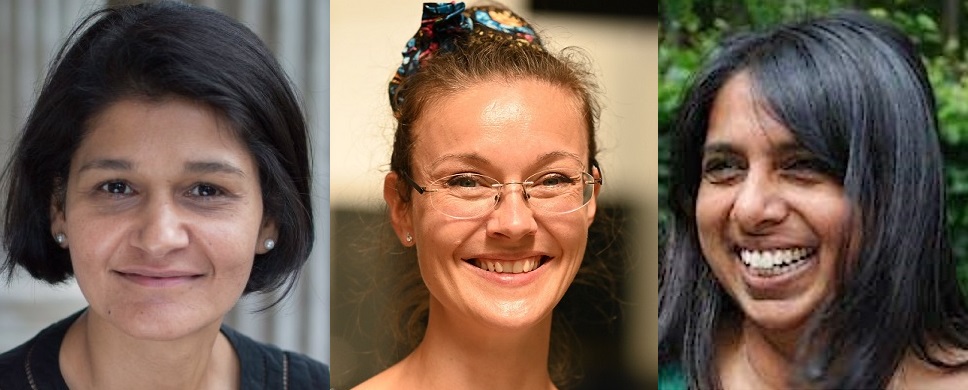
To celebrate International Women's Day, we talked to three of our pioneering women scientists in the Faculty of Health and Life Sciences. Professor Shampa Das and Professor Catriona Waitt were recently promoted to Professors within the department of Pharmacology and Therapeutics, and Professor Reecha Sofat joined as inaugural Breckenridge Chair of Clinical Pharmacology and Head of the Department of Pharmacology and Therapeutics earlier this year.
Women have been underrepresented in the field of Pharmacology and Therapeutics for many years, but this does seem to be gradually changing. We are delighted to have 3 fantastic role models in Liverpool blazing the trail for women as leaders in their scientific field.
What were your pathways into Pharmacology?
Catriona Waitt (CW): I wanted to understand more about how medicines work (or don’t) in different people, and so I did an intercalated BSc in Pharmacology as a medical student. The same types of questions led me to choose Clinical Pharmacology for my specialist training.
Shampa Das (SD): I started in industry focussing on novel formulation to improve drug delivery which led to my role as a Clinical Pharmacology Scientist within Clinical Development. Whilst initially working across many therapeutic areas, I became passionate about the development of anti-infectives which led me to academia - this allows me to both develop new agents and develop new models and mechanisms to optimise dose selection.
Reecha Sofat (RS): I trained as a physician and through medical school whilst interested in learning about cause and consequence of disease, I was very interested in treatment strategies. The marriage of pathology, physiology and manipulation through pharmacology for drug discovery just seemed really neat. At the same time evidence-based medicine and using data to support treatment choices very much came to the fore, and seeing how these data were applied at the clinical interface very much interested me. It was this combination of understanding mechanisms of disease through to drug discovery and application to patients that led me to choosing Clinical Pharmacology as a career.
Did you face challenges along the way?
CW: I was towards the end of my registrar training before I found the area that I really wanted to focus on – medication dosing, efficacy and safety in pregnant and breastfeeding mothers and their infants. It took a while to find this niche, and I was therefore uncertain for a while about options at Consultant/ Senior Lecturer level.
SD: Within a large drug development programme the value and importance of Clinical Pharmacology can often be overlooked and underestimated. The challenge was to ensure that a strong Clinical Pharmacology strategy is built into a drug programme. It is rewarding to see the positive impact this has on decision making and regulatory negotiations.
RS: The challenges are that you can’t do everything whilst everything is really interesting! But as I have grown through my career it is understanding this - focussing on areas that you can make a difference in - but also growing a team science approach to enable others coming through to address important questions borne of interest that also tackle important societal problems. COVID-19 has been a demonstrator in how this can work across sectors that had traditional boundaries, but now perhaps we have paved the way for new ways of working.
What you have learned?
CW: You can have the best drug in the world, but if you can’t get it to the right people and make sure they actually take it, it does no good. Integration of clinical work, research and public engagement means that I can respond to real-life clinical problems and communicate results back to the relevant populations in a meaningful way.
SD: Persistence, strong communication and careful consideration of how to articulate information to multi-disciplined groups.
RS: Collaborative working always brings better results as this allows the consideration of diverse opinions. Keeping messages simple but focussed for both those you work with but also for the public. Celebrating success in all those around you.
What advice would you give to women looking to pursue this type of career/research area?
CW: Never let anybody tell you that it is impossible to combine a successful academic career with a healthy family life. As a mother of five working less than full time for the past 12 years, I was criticised for being unrealistic in my goals – but my passion for my area of research, good mentors and supportive supervisors enabled me to overcome the barriers.
SD: Your career route doesn’t have to be linear. Change of direction can result in huge opportunities. It is always important to make your voice heard.
RS: It’s advice I would give to anyone man or woman, pursue something that you are interested in and being intentional through your career. Ask questions of those around you, more people are willing to support you than you might realise.
What more can be done to encourage and support women working or looking to work in this type of career/role?
CW: Advocacy for flexible working patterns, case studies of positive role models, coaching in how to advocate and negotiate on contracts. Leadership training opportunities from an earlier stage would also be advantageous. Mentorship in how to lead and chair meetings, opportunity to attend and observe higher level meetings when senior colleagues are presenting (ie at MHRA or governmental level).
SD: In addition to the above, diversity in leadership positions and opportunities to be involved in decision making and strategy from early career. Respectful meeting etiquette, allowing everyone to be heard.
RS: I would agree with above, flexible working will allow individuals to return more easily after career breaks. I think the landscape is also changing as there are more women in senior positions it does motivate women in STEM to pursue careers as they can see people that look like them in these positions.
Discover More
Read more about Professor Reecha Sofat's role at Liverpool
Find out more about Professor Shampa Das
Read more about Professor Catriona Waitt